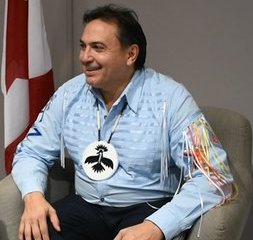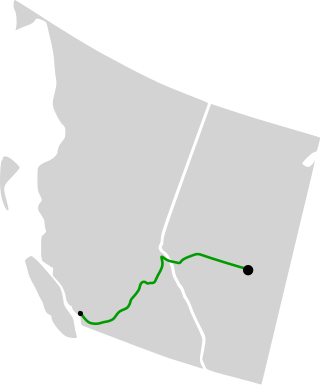Related Research Articles

The Royal Canadian Mounted Police, commonly known in English as the Mounties is the federal and national police service of Canada. As police services are the constitutional responsibility of provinces and territories of Canada, the RCMP's primary responsibility is the enforcement of federal criminal law, and sworn members of the RCMP have jurisdiction as a peace officer in all provinces and territories of Canada. However, the service also provides police services under contract to eight of Canada's provinces, all three of Canada's territories, more than 150 municipalities, and 600 Indigenous communities. In addition to enforcing federal legislation and delivering local police services under contract, the RCMP is responsible for border integrity; overseeing Canadian peacekeeping missions involving police; managing the Canadian Firearms Program, which licenses and registers firearms and their owners; and the Canadian Police College, which provides police training to Canadian and international police services. The service has faced criticism for its broad mandate, and since the early 2020s, several governments, politicians, and scholars have recommended terminating the RCMP's contract policing program. Public Safety Minister Marco Mendicino was mandated to conduct a review of RCMP contract policing when he took office in 2022.
Indigenous police services in Canada are police forces under the control of a First Nation or Inuit government. The power of Indigenous governments to establish independent police services varies, and only First Nations and Inuit communities governed by the Indian Act can establish their own police forces. Métis governments, First Nations, and Inuit governments that have completed the comprehensive land claims process can only contract police services to a third party police force. The powers of Indigenous police services also vary, and some cannot complete criminal investigations without outside consultation or maintain specialized resources, such as police dogs or crime labs.
Wabasca, also known as Wabasca-Desmarais, is a hamlet in northern Alberta, Canada within the Municipal District (MD) of Opportunity No. 17. It is located between and along the South and North Wabasca Lakes, at the intersection of Highway 813 and Highway 754. It is approximately 123 km (76 mi) northeast of Slave Lake.

Law enforcement in Canada is the responsibility of police services, special constabularies, and civil law enforcement agencies, which are operated by every level of government, some private and Crown corporations, and First Nations. In contrast to the United States or Mexico and with the exception of the Unité permanente anticorruption in Quebec and the Organized Crime Agency of British Columbia, there are no organizations dedicated exclusively to the investigation of criminal activity in Canada. Criminal investigations are instead conducted by police services, which maintain specialized criminal investigation units in addition to their community safety and emergency response mandates.
The Athabasca Chipewyan First Nation is a band government. It represents local people of the Denesuline (Chipewyan) ethnic group. It controls eight Indian reserves: Chipewyan 201 and Chipewyan 201A through Chipewyan 201G, near Fort Chipewyan, Alberta. The band is party to Treaty 8, and is a member of the Athabasca Tribal Council.

Perry Bellegarde is a Canadian First Nations advocate and politician who served as National Chief of the Assembly of First Nations from December 10, 2014, to July 8, 2021. He had previously served as chief of the Little Black Bear First Nation, chief of the Federation of Saskatchewan Indian Nations, and as the Saskatchewan regional chief of the Assembly of First Nations.
Alexander First Nation is a First Nations band government, headquartered 17 kilometres (11 mi) west of Morinville, Alberta. This First Nation is part of the Cree ethno-linguistic group, is a member of the Yellowhead Tribal Council, and is party to Treaty 6. The band controls three Indian reserves: Alexander 134, Alexander 134A, and Alexander 134B. The main reserve is bordered by Sturgeon County and Lac Ste. Anne County.

The Tar Sands Healing Walk was a 14 km annual prayer walk in demonstration against crude oil extraction in the Athabasca tar sands. It began in 2010, starting just north of the city of Fort McMurray, Alberta at a location known as the Syncrude Loop, and traveling through the heart of the tar sands extraction zone. The walk was led by local Elders, who prayed for the healing of the land and to bring attention to the destructive impacts of the tar sands.

The Trans Mountain Pipeline System, or simply the Trans Mountain Pipeline, is a pipeline that carries crude and refined oil from Alberta to the coast of British Columbia, Canada. The pipeline is currently owned by the Government of Canada through Trans Mountain Corporation, a subsidiary of the federal Crown corporation Canada Development Investment Corporation (CDEV). Until the August 31, 2018 purchase by CDEV, the Trans Mountain Pipeline was owned by the Canadian division of Houston, Texas-based pipeline operator Kinder Morgan. The pipeline has been in use since 1953. It is the only pipeline to run between these two areas.

The Unistʼotʼen Camp is a protest camp and indigenous healing centre in northern British Columbia, Canada. It is located within the traditional territory of the Unist'otʼen clan of the Wetʼsuwetʼen First Nation peoples. Established after the proposal of several pipeline projects in the area, it is situated where several pipelines will pass, as a means to block their construction.

Chipewyan 201D is an Indian reserve of the Athabasca Chipewyan First Nation in Alberta, located within the Regional Municipality of Wood Buffalo. It is on the east side of Richardson Lake, about 7 miles south of Lake Athabasca.

Chipewyan 201F is an Indian reserve of the Athabasca Chipewyan First Nation in Alberta, located within the Regional Municipality of Wood Buffalo.

The Coastal GasLink pipeline is a TC Energy natural gas pipeline under construction in British Columbia, Canada. Starting in Dawson Creek, the pipeline's route crosses through the Canadian Rockies and other mountain ranges to Kitimat, where the gas will be exported to Asian customers. Its route passes through several First Nations peoples' traditional lands, including some that are unceded. Controversy around the project has highlighted important divisions within the leadership structure of impacted First Nations: elected band councils established by the 1876 Indian Act support the project, but traditional hereditary chiefs of the Wetʼsuwetʼen people oppose the project on ecological grounds and organized blockades to obstruct construction on traditional lands.
The following is a timeline of the 2020 Canadian pipeline and railway protests which originated with the opposition by the hereditary chiefs of the Wetʼsuwetʼen people in British Columbia (BC), Canada to the Coastal GasLink Pipeline project.
The 2020 Canadian pipeline and railway protests were a series of civil disobedience protests held in Canada. The main issue behind the protests was the construction of the Coastal GasLink Pipeline (CGL) through 190 kilometres (120 mi) of Wetʼsuwetʼen First Nation territory in British Columbia (BC), land that is unceded. Other concerns of the protesters were indigenous land rights, the actions of police, land conservation, and the environmental impact of energy projects.
Roy Little Chief was a Canadian Siksika elder and former Chief of the Siksika Nation from 1981 to 1983. He was a longtime activist for the rights of First Nations and indigenous people in Canada.
Several policies regarding interior and domestic issues in Canada were planned and adopted by the Canadian Cabinet, chaired by Prime Minister Justin Trudeau, following the October 19, 2015 election of the Liberal Party to a majority of seats in the House of Commons, such as social and environmental policies.
A series of vandalizations, arsons, and suspicious fires in June and July 2021 desecrated, damaged, or destroyed 68 Christian churches in Canada. Coincident with fires, vandalism and other destructive events damaged churches in Canada and the United States, primarily in British Columbia. Of these, 25 were the results of fires of all causes. Canadian government officials, church members, and Canadian Indigenous leaders have speculated that the fires and other acts of vandalism have been reactions to the discovery of over 1,000 unmarked graves at Canadian Indian residential school sites.
Police brutality is an instance or pattern of excessive and unwarranted force used against an individual or group of people. The Indigenous peoples of Canada include, as designated by the Canadian government, Inuit, Metis, and First Nations individuals and are officially considered Aboriginal peoples. Indigenous Canadians have experienced strenuous relationships with police as a result of colonization and lasting tensions. Since the early 2000s, several instances of police brutality against Indigenous Canadians have prompted media attention.
References
- ↑ "Canada indigenous chief battered during arrest". BBC News. 2020-06-13. Retrieved 2020-06-13.
- ↑ Porter, Catherine; Bilefsky, Dan (2020-06-12). "Video of Arrest of Indigenous Leader Shocks Canada". The New York Times. ISSN 0362-4331 . Retrieved 2020-06-13.
- 1 2 Porter, Catherine; Bilefsky, Dan (2020-06-12). "Video of Arrest of Indigenous Leader Shocks Canada". The New York Times. ISSN 0362-4331 . Retrieved 2020-06-13.
- 1 2 Weber, Bob (2020-06-12). "'Born leader': Contradiction is Alberta Chief Allan Adam's strength". National Post. Retrieved 2020-06-13.
- ↑ "Chief and Council". Athabasca Chipewyan First Nation. Retrieved 2020-06-13.
- ↑ Wohlberg, Meagan (2015-08-24). "Athabasca Chipewyan defends non-compliance with FNFTA in court". Northern Journal. Retrieved 2020-06-13.
- ↑ Dinshaw, Fram (2015-11-04). "Allan Adam wins re-election as chief of Athabasca-Chipewyan First Nation". National Observer. Retrieved 2020-06-13.
- ↑ Craik, Neil (2016). "Process and Reconciliation: Integrating the Duty to Consult with Environmental Assessment". Osgoode Hall Law Journal. 53 (2): 667–668. 2016 CanLIIDocs 4298 – via CanLII.
- ↑ Adam v Canada (Environment), 2014 FC 1185
- ↑ Weber, Bob (2016-09-19). "Alberta First Nation revives lawsuit over Grand Rapids pipeline". The Globe and Mail. Retrieved 2020-06-13.
- ↑ Winkler, Marc (2018-08-10). "Chief urges Indigenous business leaders to support Trans Mountain pipeline". CBC News. Retrieved 2020-06-13.
- ↑ The Canadian Press (2020-06-24). "Charges dropped against First Nations Chief Allan Adam in violent arrest". CBC News . Retrieved 2020-06-24.
- ↑ "Greta Thunberg calls video of Chief Allan Adam's RCMP arrest 'very disturbing to see'". Global News. Retrieved 2020-06-13.
- ↑ News; National (2020-06-12). "New video shows RCMP tackling and punching Alberta chief Allan Adam in arrest | National Post" . Retrieved 2020-06-13.
{{cite web}}:|last1=has generic name (help) - ↑ Foreign Staff (2020-06-13). "Justin Trudeau 'shocked' by video of indigenous chief being punched by police in Canada". The Telegraph. ISSN 0307-1235 . Retrieved 2020-06-13.